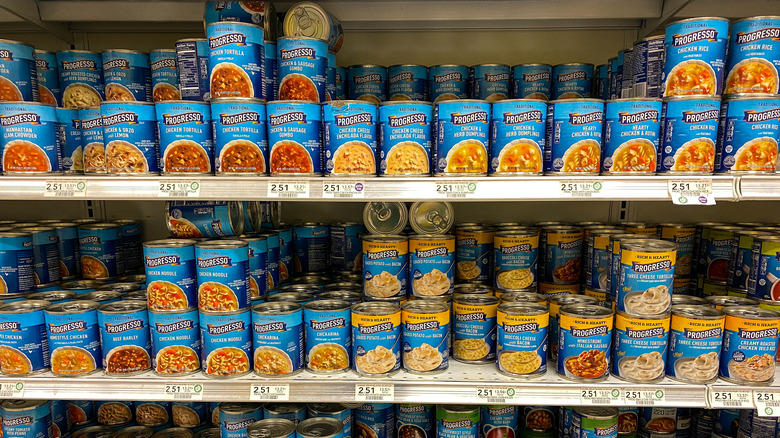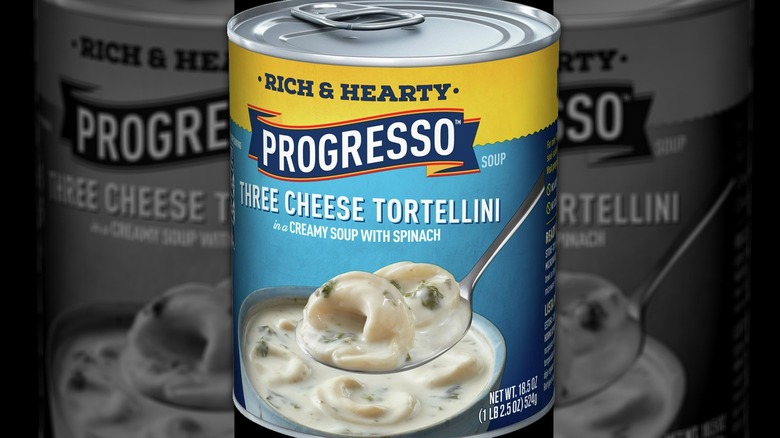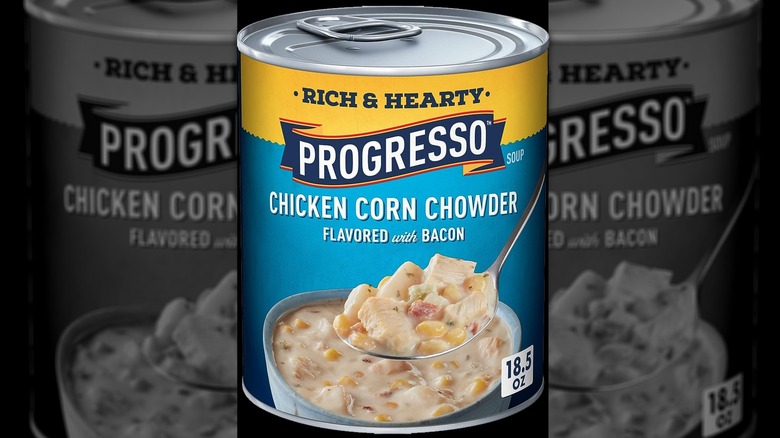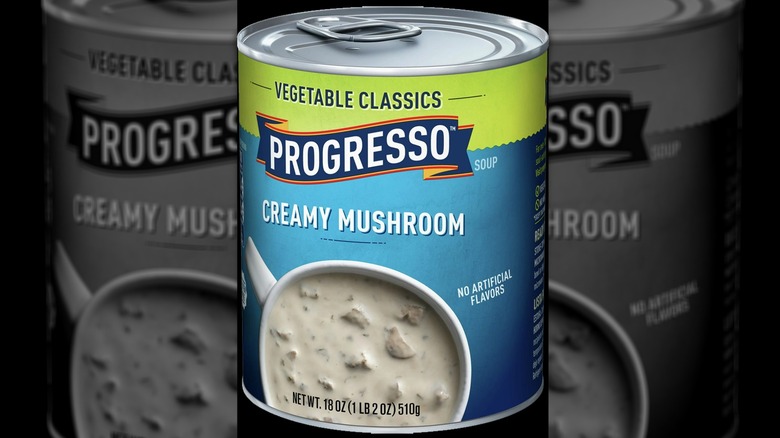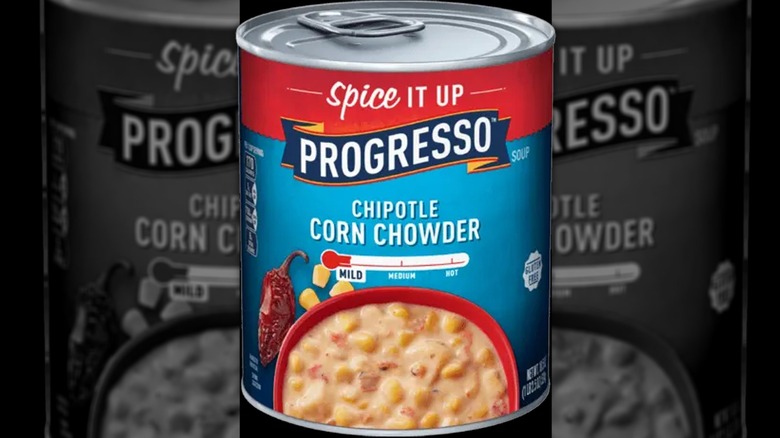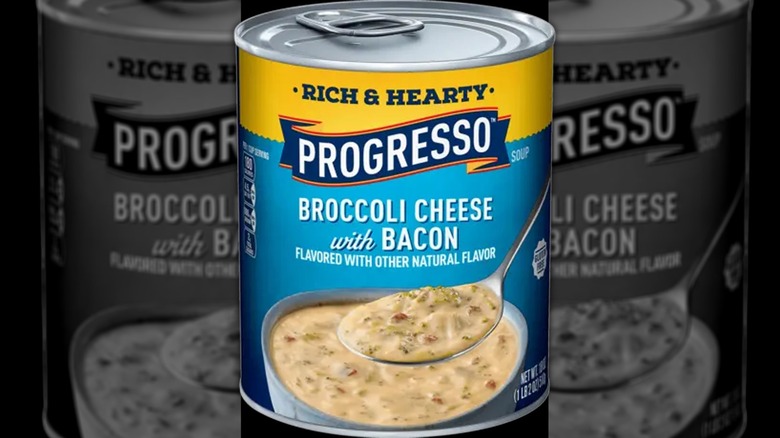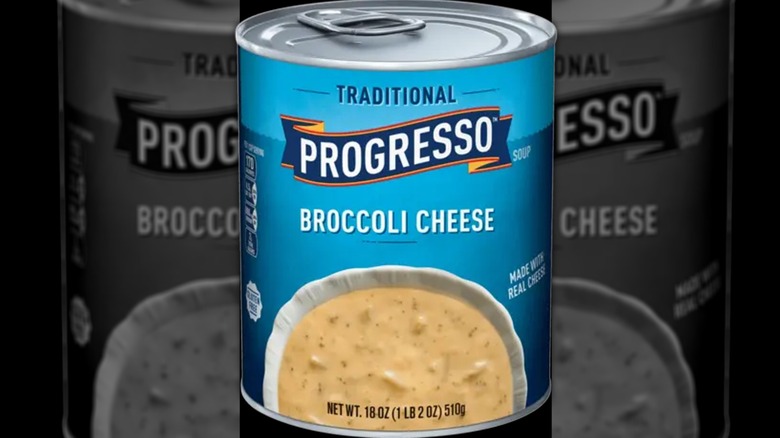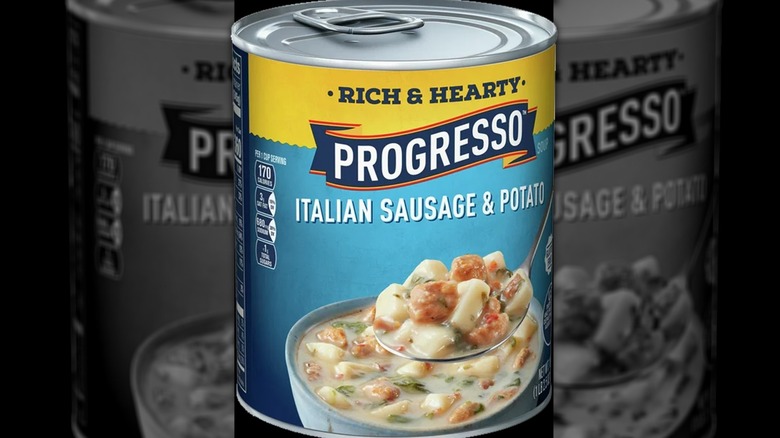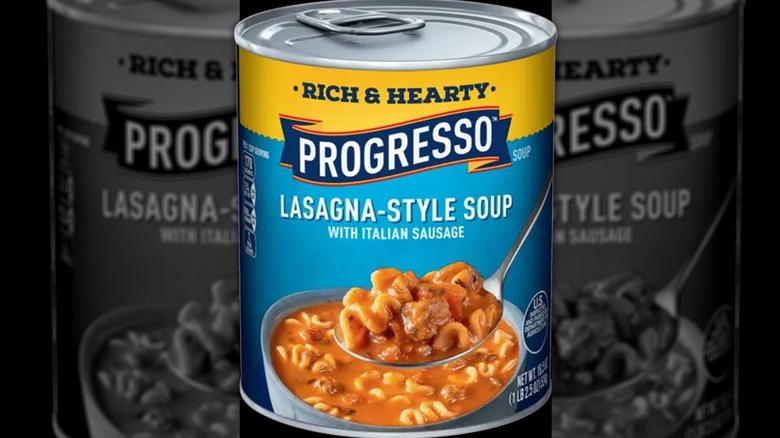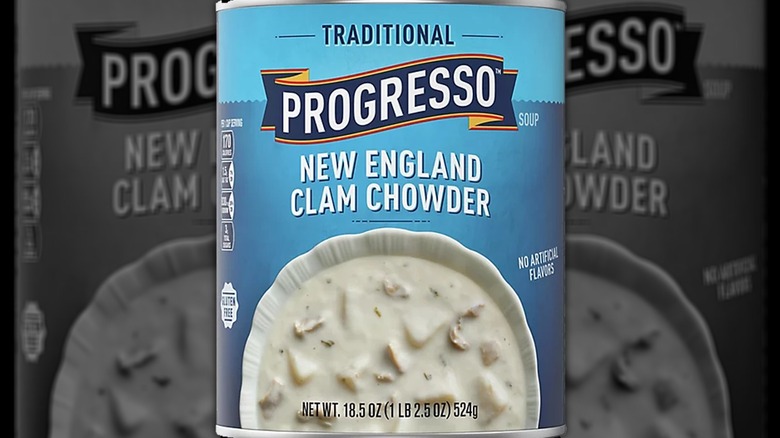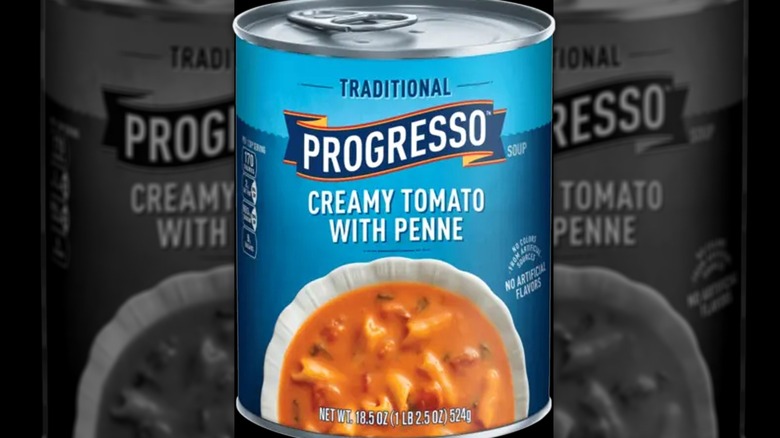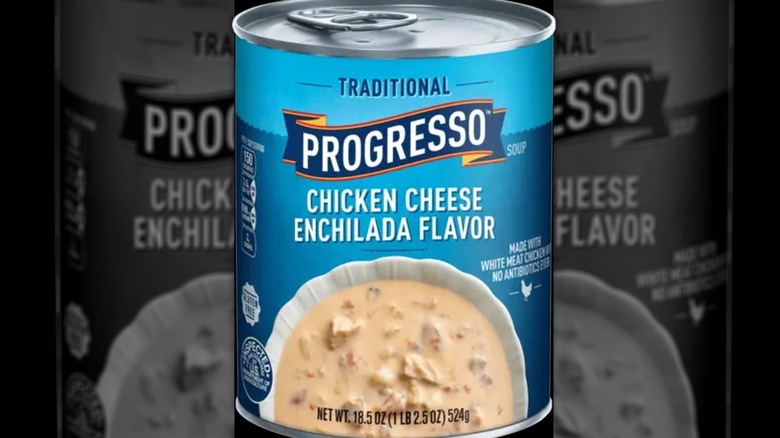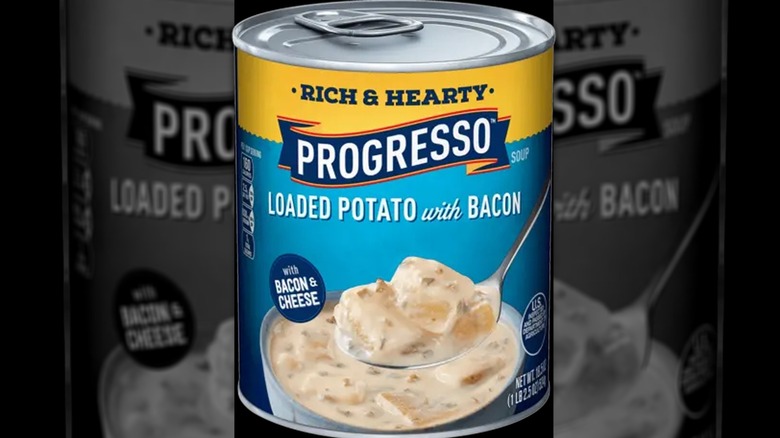12 Of The Unhealthiest Progresso Soup Flavors You Can Buy
We may receive a commission on purchases made from links.
Progresso's marketing message highlights its ingredients' quality and commitment to avoiding artificial flavors, but is it really as healthy as it claims? Progresso canned soups, while convenient and diverse in flavor, have shown some consistent patterns in nutritional content that raise health concerns.
Most notably, high sodium was prevalent across many varieties, a factor that, if consumed regularly, can lead to hypertension and other cardiovascular issues, according to Healthline. Additionally, many of these soups lacked essential nutrients; for example, vitamin D's consistent absence was particularly noticeable. The presence of modified food starch can be a source of maltodextrin, which can cause blood sugar spikes in another report from Healthline.
On top of this, even soups that boasted vegetable or grain content often had surprisingly low fiber quantities, making the contribution to digestive health and satiety less than optimal, according to Mayo Clinic. Ingredients like natural flavor, emulsifiers like DATEM, and certain additives might not resonate with those aiming for a natural diet. Furthermore, while not egregiously high, the addition of sugars in some varieties, combined with common allergens like soy and milk, suggest that regular consumption without complementing fresh, whole foods might not support a balanced and healthful diet as suggested by NHS.
1. Rich & Hearty Three Cheese Tortellini
Progresso's Rich & Hearty Three Cheese Tortellini in a Creamy Soup with Spinach appeals to those who love a creamy, cheesy bite balanced with the earthiness of spinach, all in a quick, ready-to-eat meal. While it is conveniently canned and advertised without artificial flavors or colors, it comes with several downsides.
At 700 milligrams of sodium per serving, this soup accounts for around 30% of the maximum recommended daily value of 2,300 milligrams. Keep in mind there are two servings per can and that the number doubles if a whole can is consumed as a full meal in one sitting. It lacks many essential vitamins and minerals. Notably, it offers 0% of daily vitamin D and potassium, with only trace amounts of iron, limiting its contribution to a balanced diet, as shown by NHS.
In the ingredients list, the presence of carrageenan, used here as a stabilizer, has been a topic of debate regarding its digestive safety. As told by MedicineNet, numerous individuals have shared negative health effects linked to carrageenan, reporting symptoms like stomach cramps, diarrhea, and bloating akin to irritable bowel syndrome. It further added that avoiding products with carrageenan alleviated the symptoms.
2. Rich & Hearty Chicken Corn Chowder Flavored with Bacon
Progresso's Rich & Hearty Chicken Corn Chowder, flavored with bacon, is a comforting canned delight that many can turn to for a quick and warm meal. Packed with corn, potatoes, celery, onion, and white meat chicken, it is gluten-free and designed to emulate the heartiness of a homemade chowder. Regrettably, there are certain aspects of this product that raise nutritional concerns.
First and foremost, the sodium content stands at a hefty 850 milligrams per serving, making up 37% of the daily recommended value. This is almost 75% of the daily sodium limit in a single can. According to Harlem Cardiology, excessive sodium intake causes the body to retain more water, increasing blood volume and raising blood pressure. While the soup offers a small portion of your daily potassium and protein, it is glaringly deficient in essential vitamins such as vitamin D and minerals like calcium, both contributing 0% to the daily recommended intake.
The soup contains modified food starch, commonly used to alter texture, but frequent consumption is not recommended. Based on information from Is It Bad For You, some individuals have noted adverse reactions such as chest discomfort, heartbeat irregularities, and feelings of nausea after consuming modified food starch, though these symptoms aren't universal.
3. Vegetable Classics Creamy Mushroom
Progresso Vegetable Classics Creamy Mushroom Soup offers a burst of portabella mushrooms enveloped in a rich, creamy broth. Being microwavable makes for a quick, comforting meal, especially when accompanied by a slice of warm bread or a side salad. As with many processed foods, diving deeper into the nutritional content reveals concerns.
The soup brings a certain creaminess to the table, evident from its 9 grams of fat per serving, but it only contains 2 grams of protein. The dietary fiber content is notably low, with less than 1 gram per serving. Healthline suggests that foods rich in fiber and protein, especially when unprocessed, tend to keep one satiated for longer periods. Additionally, the sodium content is on the higher side, with 800 milligrams per serving, accounting for 35% of the daily recommended intake.
The ingredients list includes soybean oil, which is high in omega-6 fatty acids. A 2009 study by the American Heart Association highlights that while omega-6 is essential for the body, its excessive consumption, common in contemporary diets, can induce inflammation, making individuals more susceptible to chronic diseases. As previously mentioned, we also see modified food starch included, which has potential downsides.
4. Spice It Up Spicy Chipotle Corn Chowder
For those seeking to bring a kick to their mealtime, Progresso's Spice It Up Spicy Chipotle Corn Chowder might be the answer. This soup, part of Progresso's spicy range, is infused with the rich flavors of chipotle, combined with classic ingredients such as corn, potatoes, and roasted red bell peppers with no artificial flavors or colors. Zest and convenience are clear merits, but there are other considerations.
A single serving contains 750 milligrams of sodium, or 33% of the daily recommended value. The soup contains 26 grams of carbohydrates per serving, but only 2 grams come from dietary fiber. Of the remaining carbohydrates, 6 grams are sugars, with half of that amount being added sugars. It's important to note, as highlighted by the Centers for Disease Control and Prevention that dietary fiber plays a key role in stabilizing blood sugar levels. The body doesn't digest fiber, ensuring that it doesn't cause sudden spikes in blood sugar, thereby helping to maintain consistent and healthy levels.
Hydrolyzed proteins, commonly used in foods as flavor enhancers due to their glutamic acid content, can pose issues for certain individuals. Per CBC News, some may exhibit sensitivity to these compounds, experiencing symptoms such as accelerated heartbeat, unease, and facial tension upon consumption.
5. Rich & Hearty Broccoli Cheese with Bacon
Progresso's Rich & Hearty Broccoli Cheese with Bacon soup offers a sumptuous blend of broccoli complemented by authentic cream cheese and cheddar, all accentuated by the smoky undertones of bacon. Peeling back the comforting exterior reveals some elements that might give the health-conscious consumer pause. The inclusion of both chicken fat and bacon fat contributes to the soup's 12 grams of total fat per serving. Of that number, 4.5 grams are saturated fats, constituting 22% of the daily value.
The American Heart Association recommends limiting saturated fat intake as it can raise blood LDL levels, which in turn heightens the risk of cardiovascular diseases and stroke. Moreover, while the soup contains 10 grams of carbohydrates, only 1 gram is dietary fiber. The soup also completely lacks vitamin D.
A recurring theme in these products is that this soup carries potential drawbacks by including soybean oil and modified food starch. Bacon, a component of the soup, contains sodium nitrite. Drawing from MedicineNet, sodium nitrite in processed meats is known for preservation while enhancing flavor and appearance. Yet, under high heat or intense acidity conditions, sodium nitrite can transform into nitrosamine in the body, a compound linked to a higher risk of stomach cancer because of its carcinogenic properties.
6. Traditional Broccoli Cheese
Progresso's Traditional Broccoli Cheese soup is a comforting concoction swirling with a rich blend of broccoli and genuine cheese, and it's gluten-free. However, a single serving contains a significant 790 milligrams of sodium, making up 34% of the daily recommended value. This, combined with 4 grams of saturated fat in the mix, could pose cardiovascular concerns if one were to consume an entire can, as noted by American Heart Association. Even though broccoli and cheese are highlighted, the soup offers just 1 gram of fiber and 5 grams of protein. The Better Health Channel highlights the risks of low fiber intake, linking it to health issues like constipation, irritable bowel syndrome, and certain bowel cancers.
Delving deeper into the ingredient list, sodium phosphate is used, likely for flavor enhancement and texture. A 2012 study on Aerzteblatt indicates that artificial sodium phosphate, when consumed, might present health challenges different from its natural counterpart due to the body's absorption method. Elevated phosphate levels can potentially increase mortality risks, especially in individuals with kidney or cardiovascular conditions. And, while the soup is promoted as free from artificial flavors, the presence of natural flavor might be masking ingredients that underwent extensive processing, potentially containing artificial elements.
7. Rich & Hearty Italian Sausage and Potato
Each spoonful of Progresso's Rich & Hearty Italian Sausage & Potato delivers a rich medley of Italian sausage, potato chunks, crisp onions, and fresh spinach, all enveloped in a savory chicken broth. Glancing at the nutrition label reveals that the 680 milligrams of sodium and 3 grams of saturated fat per serving might deter those monitoring their sodium intake, especially individuals with hypertension or heart concerns. Additionally, the soup has limited vitamins and minerals, with no detectable amounts of vitamin D and Calcium and only minor contributions from Iron and Potassium.
A deeper dive into the ingredients uncovers both modified food starch and hydrolyzed protein. Is It Bad For You points out that modified food starch often contains maltodextrin to mask the use of monosodium glutamate, or MSG. Given that hydrolyzed protein — which we learned earlier is a source of glutamate — is also present, one might wonder if it's the sole glutamate source or if there's unmentioned MSG lurking. The inclusion of bacon, unsurprisingly, adds sodium nitrite, a previously identified potential carcinogen on MedicineNet, into the recipe. The term natural flavor also raises eyebrows, making one ponder the true wholesomeness of this soup.
8. Rich & Hearty Lasagna-Style with Italian Sausage
Progresso's Rich & Hearty Lasagna-Style Soup With Italian Sausage evokes the comforting flavors of traditional lasagna, seamlessly melding Italian sausage, tangy tomatoes, and pasta into a soup form. The soup features enriched Mafalda pasta, and while enriched might sound beneficial, it signifies that the grain underwent refining, stripping it of its natural nutrients, before being artificially supplemented. This results in a less advantageous nutrient profile than whole grains. According to the Bannister Center, a diet high in refined pasta increases the risk of diabetes, hypertension, and cardiovascular diseases.
The soup's carbohydrate tally is 20 grams per serving, with a mere 2 grams derived from dietary fiber. Sugar also makes a notable appearance, clocking in at 7 grams in total, with 4 grams specified as added sugars. The CDC has highlighted that excessive consumption of added sugars can lead to health complications, encompassing obesity and heart-related issues. Like other soups in this selection, vitamin D is missing.
In the ingredient list, alongside the term natural flavors, its more enigmatic counterpart, flavoring, is also mentioned. The presence of these vaguely labeled items adds a layer of uncertainty. Although cornstarch serves as a thickening agent, its high carb content and elevated glycemic index can be problematic; HealthifyMe suggests it might lead to significant blood sugar spikes.
9. Traditional New England Clam Chowder
Progresso's Traditional New England Clam Chowder brings the seaside right to the table with its generous chunks of potatoes and clams swirled in a rich cream, New England style, ready to warm the stomach. A prominent concern arises from the sodium content: A staggering 830 milligrams per serving, which represents a significant 36% of the recommended daily value, all from just 1 cup. On the nutritional side, the soup disappointingly offers no vitamin D or calcium, and while it contains 23 grams of carbohydrates, only 1 gram comes from dietary fiber.
Breaking down the ingredients, we encounter recurring elements like modified food starch, soybean oil, and natural flavor. Whey protein, generally deemed safe for consumption, can present potential side effects such as reduced appetite, fatigue, thirst, and increased bowel movements, as mentioned by WebMD. The inclusion of yeast extract in the soup is another term to approach with caution. It's frequently used to incorporate added glutamates without MSG. However, according to the Center for Science in the Public Interest, it might not induce the common MSG-associated side effects like headaches or flushing. Lastly, clams, an essential component of the soup, contain cadmium. A 2013 study on Hindawi pointed out that this can lead to adverse nervous system reactions, manifesting symptoms like vertigo, headaches, loss of balance, and diminished mental acuity.
10. Traditional Creamy Tomato with Penne
Progresso's Traditional Creamy Tomato With Penne is a blend of the familiar creamy tomato soup with penne pasta. This concoction brings the rich flavors of tomatoes and promises a serving of ½ cup of vegetables, making it sound like a nutritious choice. However, delving into the label, the 22 grams of carbohydrates only offer 3 grams of dietary fiber, a stark contrast to the claim. Furthermore, the sodium content stands out at 690 milligrams per serving, equating to 30% of the daily recommended intake. The soup also contains 8 grams of total sugars, half of which are added sugars that, if consumed excessively, have been linked to various blood sugar issues.
Among the ingredients, the soy protein concentrate stands out. It's soybean with most of the carbohydrates removed, but it still contains phytoestrogens, which have stirred debates in numerous studies. As the Harvard T.H. Chan School of Public Health highlights, soy is rich in isoflavones, plant compounds that can mimic the effects of estrogen in our bodies and, as a result, may either slightly boost or decrease estrogen-like activity. Further adding to the concern, Johns Hopkins Medicine indicates that these effects could potentially impact various aspects of our health, including reproductive functions, bone health, and other processes regulated by estrogen.
11. Traditional Chicken Cheese Enchilada
Progresso's Traditional Chicken Cheese Enchilada Flavor, brimming with spicy chicken, vegetables, and white meat chicken, presents itself as a warm, comforting, and protein-rich choice, especially considering its gluten-free label. However, a closer look reveals that a serving contains only a modest 6 grams of protein. Moreover, the sodium content is high, registering at 670 milligrams or 29% of the recommended daily value, complemented by a significant 3.5 grams of saturated fat, which is 17% of the daily value.
The ingredient list also highlights the inclusion of DATEM, an emulsifier deemed safe by the FDA. Still, an early study by Inchem involving lab animals has associated DATEM with heart fibrosis and adrenal overgrowth. Another ingredient, sorbic acid, often used as a preservative, is generally considered safe in the amount found in canned foods such as this. However, it's essential to note that, although rare, it can trigger allergic reactions in some individuals. As reported by Healthline, these reactions are generally subtle, often presenting as minor skin irritation.
12. Rich & Hearty Loaded Potato with Bacon
Progresso's Rich & Hearty Loaded Potato with Bacon soup certainly lives up to its loaded claim. Combining potatoes, celery, onions, and bacon in a rich, creamy base makes it the ideal choice for those moments that call for a hearty, soul-warming soup, especially on those colder days. However, beneath its comforting exterior lies some concerning nutritional data. A single half-can serving contains a notable 760 milligrams of sodium, accounting for 33% of the recommended daily intake. Additionally, while 3 grams of saturated fat per serving might not seem alarming on its own, it can quickly accumulate, especially if the soup is consumed in larger portions or accompanied by other high-fat dishes.
Diving deeper into the ingredient list, we spot the inclusion of modified food starch, suggesting the presence of maltodextrin. Drawing from MedicalNewsToday, a consistent intake of maltodextrin-rich products often correlates with diets abundant in sugar, scant in fiber, and teeming with processed components. Such dietary patterns elevate the risk factors for high cholesterol, unintended weight gain, and even type 2 diabetes. This perspective is further supported by the Glycemic Index Guide, which points out the potential for maltodextrin to cause rapid fluctuations in blood sugar levels. Over time, these fluctuations could lead to insulin resistance, a precursor to diabetes.
